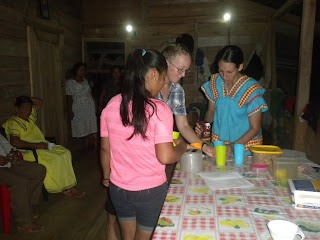Last year, the Peace Corps Panama Passover Potluck
enjoyed so much success that new Volunteers were asking me months in advance
whether there would be a Passover 2016 – based only on seeing my blog post.
So of course, I had to do it again. And step it up.
First, I decided that instead of hosting Seder at my
house and inviting Volunteers and my favorite community families, I would ask
to hold Passover at the house of one of my favorite families – at Ema’s house,
my abuelita. Ema and Jose were delighted to host the
Seder, but I needed to check about a few things first. Part of the Seder is to have 4 glasses of
wine throughout the course of the ceremony, each playing a different symbolic
role. Ema’s family is the Ngäbe religion
Mama Tada, which prohibits, among other things, alcohol and dancing. So I asked Ema: I understand that your
religion prohibits alcohol, but can we include wine as part of this Jewish
tradition? Her response: Wine doesn’t
count! Of course! This Seder was off to a good start.
Three other Volunteers arrived April 30 to join the
Seder. We carried several boxes of wine,
matzah, Mom’s-recipe charoset, Seder plate items, and kosher-for-Passover appetizers
on the hour hike up the hill, picking up Angel’s family along the way. Once everyone was present – twenty-some
people – and the sun was setting, the Seder began.
This is the first Seder that I’ve been to that was
conducted in four languages – some Hebrew, some Spanish, some Ngäbere, some
English. Ema’s family was fascinated by the
Hebrew prayers that we sang – lighting the candles, blessing the wine, the
parsley, the matzah – and translated into Spanish. We made sure everyone participated in the ritual
handwashing at the beginning, as good Environmental Health Volunteers – after all,
God wants your hands clean before you eat so you don’t get sick.
Rather than read through the Haggadah, the other
Volunteers, Nayelis, and I acted it out in a sociodrama, true
Peace-Corps-capacitation-style. Zoe was
Pharaoh, David was Moses, Nayelis and I were Egyptians, MC was God, and Ema’s
family was the Hebrews. Nayelis and I
yelled at Ema’s family as if they were slaves.
MC and David communicated via cell phone – and it turned out that God
kept running out of money on her phone, cutting short her calls to Moses. Nayelis and I ran around as if the plagues
were chasing after us. It helped that
the family had been listening to Moises
on the radio, and knew the story – though this was a slightly different
interpretation. “Should Moses really be
talking back to God like that?” someone asked me in response to the David’s
increasingly sassy phone calls with MC. “I
mean, that’s actually kind of accurate – pretty much all of the Jews in the
Bible argued with God!”
After the Seder and our four glasses of wine, prior to
dinner, the kids even started an impromptu dance party – and were joined by the
matriarch herself, as 70-something-year-old Ema surprised everyone and came out
to dance tipico with MC.
The Seder sociodrama was hilarious, the potluck was
delicious, the entire experience warm and joyful – better that I could have
possibly imagined. Ema’s family loved
it. The Volunteers loved it. I loved it.
It felt just like all of those fun Seders of the past – with family and
friends, part ceremony, part ridiculous, irreverent hilarity.
It was as close to being home as I could get without
actually being there. Here, in Panama,
with my second family, this Seder had that warmth and comfort and closeness and
joy. Which is really what Passover –
with its tradition of remembering and of passing along stories generation to
generation – is all about. Celebrating
with family.
Next year in America!
--
--
--
And, thinking about the family that is my community, I
wrote this:
My Gente
In the
beginning, they were my gente. My people.
My people
who were assigned to me.
Whom I was
supposed to help.
Then, they
were my gente. My people.
My people
with whom I live.
Who share
their home with me.
Y’know, my gente.
Who feed me
strange things.
And teach me
their world.
Who
frustrate me.
And make me
smile.
Finally,
they became my gente. My people.
My people
because I am a part of them.
And they are
a part of me.
I am one of
them; we are family.
I would
fight for them,
They would
fight for me.
We may
squabble sometimes
But don’t
you dare say anything bad about them.
‘Cuz they’re
my gente.
Like my
little brother
On the bus
with me
Getting
picked on by the big kids
Back in
sixth grade.
They are my gente.
My people.
They are
mine.
Because they
are me.
My gente.
My people.
I wonder.
Can all the gente of the world
Become my gente?
Pictures:
We sing in Hebrew the prayers at the beginning of Seder.
We pour the first glasses of wine for everyone…
…and hand them out.
I’m explaining something – Ema and Jose have front-row
seats.
MC explains the importance of the ritual handwashing.





This comment has been removed by a blog administrator.
ReplyDelete